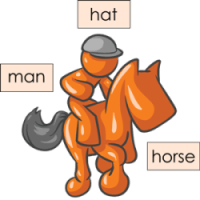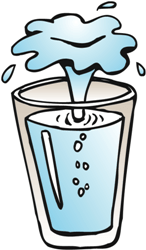English Nouns
 An noun is a
word that names a person, a place or a thing.
An noun is a
word that names a person, a place or a thing.Examples:
Sarah, lady, cat, New York, Canada, room, school, football, reading.
Example sentences:
- People like to go to the beach.
- Emma passed the test.
- My parents are traveling to Japan next month.
Click Here for Step-by-Step Rules, Stories and Exercises to Practice All English Tenses
The word "noun" comes from the Latin word nomen, which means "name," and nouns are indeed how we name people, places and things.
Abstract Nouns
An abstract noun is a noun that names an idea, not a physical thing.
Examples:
Hope, interest, peace, ability, success, knowledge, trouble.
Concrete Nouns
A concrete noun is a noun that names a physical thing. 
Boy, table, floor, coffee, beach, king, rain, children, professor.
Common Nouns
A common noun is a noun that names a general thing, not a specific
thing.
Examples:
Boy, girl, city, country, company, planet, location, war.
Proper Nouns
A proper noun is a noun that indicates the specific name of a thing. It
begins with a capital letter.
Examples:
Robin, Alice, London, Sweden, Google, Earth, Eiffel Tower, Civil War.
(Compare these examples to those in the "Common nouns" section to see the difference.)
Countable Nouns
A countable noun is a noun that indicates something you could
actually count. 
For example, you could count pigs:
one pig, two pigs, three pigs...
However, you couldn't count water: one
water, two water – no, it doesn't work...
A countable noun has both a singular and a plural
form, and it can be used with the indefinite articles
(a/an).
Examples:
Window, teacher, tree, lion, eye, cloud, pencil, heart, movie.
Click here to read more about countable nouns.
Click here for a lesson on plural Nouns in English (singular and plural nouns, plural nouns rules, irregular plural nouns, and more).
Uncountable Nouns
An uncountable noun is a noun that indicates something you
cannot count.
For example, you could count pigs:
one pig, two pigs, three pigs...
However, you couldn't count water: one
water, two water – no, it doesn't work...
An uncountable noun has only one form (no plural), and it cannot be
used with the
indefinite articles (a/an).
Examples:
Furniture, advice, mail, news, equipment, luggage, work,
coffee, information.
Click here to read more about uncountable nouns.
Collective nouns (group nouns)
Collective nouns are nouns that describe a group.
She teaches a small class of students

Examples:
bundle, class,
family, herd, pile, police, team, etc.
These can also be called group nouns.
Click here to read more about collective nouns.
Compound Nouns
A compound noun is a noun made with two or more words. Each compound noun works as a single noun.
It's important to brush your teeth with a toothbrush.

Examples:
- mother-in-law
- cellular phone
- chalkboard
Click here to read more about compound nouns.
Get Updates, Special Offers, and English Resources
Download your FREE GIFT (the first two chapters of
English Short Stories Book and Workbook)
as soon as you join!

By submitting your email, you consent to receiving updates and newsletters from us and to the sharing of your personal data with third parties for the purposes of sending you communications. We will not spam you. You can unsubscribe at any time. For more information, please see our privacy policy.
Return from English Nouns to English Parts of Speech
Return from English Nouns to Learn to Write in English





